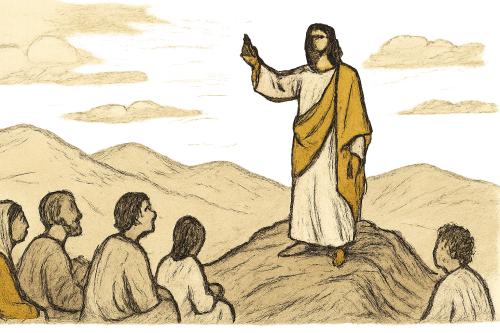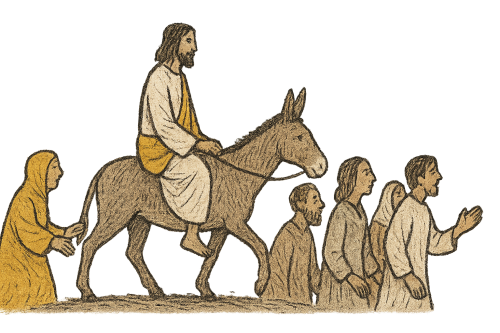“Thy kingdom come” is a familiar line from the Lord’s Prayer found in Matthew 6:10. Many Christians recite this prayer regularly but what do these words actually mean? Jesus taught His followers to pray for God’s Kingdom to come – a request packed with hope, promise, and challenge.
Understanding this phrase in its biblical context and historical setting can help us grasp the kingdom come meaning and how Jesus’ first-century audience would have heard it. We’ll explore the meaning, the significance of the Kingdom of God (also called the Kingdom of Heaven) in Jesus’ teaching, how it contrasts with earthly kingdoms, and what it means for believers today.
Also read: Who Did Jesus Say He Was? Exploring What the Bible Says About Jesus’ Identity
“Thy Kingdom Come” Meaning in the Lord’s Prayer
When Jesus says “Thy kingdom come” in the Lord’s Prayer, He is teaching us to earnestly ask for God’s reign to be realized on Earth.
“Thy kingdom come, thy will be done, on earth as it is in heaven.” (Matthew 6:10)
Matthew 6:10
Jesus is referring to God’s Kingdom – God’s rule and authority. To pray “thy kingdom come” is to invite God to take charge, to let His will be done in our world just as completely as it is in heaven. It’s a prayer for God’s righteous, loving reign to transform everything around us.
Longing for God’s Rule on Earth
Jesus first gave this prayer to ordinary Jewish people in the first century. His audience lived under Roman occupation so they were a powerless crowd living under Roman oppression. They longed for freedom and for God to establish His Kingdom in place of earthly tyrants. In that context “thy kingdom come” was a radical plea. It meant “God, become our King! Set things right!”.
Many first-century Jews expected that the Messiah (God’s chosen king) would lead a political revolution, liberating Israel from Rome and restoring a glorious earthly kingdom. Based on Old Testament prophecies they were expecting a kingdom of great blessing and victory which God would set up through the Messiah. They imagined the Kingdom of God would arrive with visible power – overthrowing evildoers, exalting Israel and ushering in an age of peace.
However, Jesus’ teaching on the Kingdom both fulfilled and challenged those expectations. By instructing His disciples to pray for God’s Kingdom to come Jesus acknowledged that in one sense the Kingdom was still future. God’s perfect rule hadn’t yet been fully realized on Earth. At the same time Jesus was bringing forth that very Kingdom through His own life and ministry. The phrase “thy kingdom come” on Jesus’ lips carried both a present hope (God’s Kingdom is breaking in now) and a future hope (God’s Kingdom will one day be fully established).

The Kingdom of God Meaning and Significance
Jesus’s Teachings
The Kingdom of God is at the heart of Jesus’ message. In fact, the very first summary of Jesus’ preaching is:
“The time is fulfilled, and the kingdom of God is at hand; repent and believe in the gospel” (Mark 1:15).
Mark 1:15
The term “Kingdom of God” (or “Kingdom of Heaven” in Matthew’s Gospel) doesn’t refer to a physical place but rather to the rule or reign of God. Biblical scholars note that the Greek word for “kingdom” basileia primarily means the act of ruling or kingship not just a geographical realm.
Jesus came announcing the “good news” of the Kingdom. The Bible Project puts it this way: the gospel is more than a personal salvation message, “It’s a royal announcement” of God’s Kingdom coming to Earth through Jesus.
Jesus’ listeners knew earthly kingdoms, like the Roman Empire, with emperors who demanded loyalty. Jesus described God’s Kingdom is a very different kind of reign. It’s not marked by pomp, borders, or armies, but by God’s presence and power renewing lives. Wherever God is accepted as King and wherever people live under His rule is where the Kingdom is at work. Jesus even said,
“the kingdom of God is in the midst of you” (Luke 17:21)
Luke 17:21
Also check out: 5 Reasons Jesus Used Parables in His Teachings
Understand Through Parables
Throughout the Gospels, Jesus uses parables to teach about the Kingdom’s meaning. For example He likened God’s Kingdom to a tiny mustard seed that grows into a large tree, or a little bit of yeast that leavens a whole lump of dough.
“The kingdom of heaven is like a mustard seed” (Matthew 13:31)
These paints to the listener that God’s Kingdom may start small and hidden but it has unstoppable growth and influence. It transforms lives from the inside out, rather than arriving by a show of force. The Kingdom of God, Jesus taught, brings transformation – it is God’s power making things new, often in quiet, humble ways rather than flashy displays.
Crucially, Jesus taught that the Kingdom of God was good news especially for the humble, the poor, and the outsider.
“Blessed are the poor in spirit, for theirs is the kingdom of heaven,” (Matthew 5:3).
Matthew 5:3
In God’s Kingdom the values are upside-down compared to worldly values: the first will be last and the last first, the meek inherit the earth, and sinners and outcasts find grace. Jesus demonstrated this by welcoming tax collectors and sinners, by healing lepers and the blind.
The Kingdom of Heaven vs. Earthly Kingdoms
Jesus made it clear that His Kingdom is not like any earthly kingdom. When standing before the Roman governor Pontius Pilate, Jesus explained, “My kingdom is not of this world.”
“My kingdom is not of this world. If it were, my servants would fight… But now my kingdom is from another place.” (John 18:36)
John 18:36
Unlike earthly empires, which are often built on conquest, selfish ambition, and human pride, Jesus’ Kingdom operates on very different principles. The kingdom of God presents a new kind of kingship.Oone characterized by humility, truth, and sacrificial love.

Earthly kings and rulers typically assert dominance through force or political power. In contrast, Jesus inaugurated His Kingdom by serving others and laying down His life. He rode into Jerusalem on a donkey (a symbol of peace and humility) rather than a war-horse (Matthew 21:5). He told His disciples that in His kingdom:
“whoever would be great among you must be your servant” (Mark 10:43).
Mark 10:43
Jesus and the Kingdom of God stood in stark contrast to the oppressive regimes people knew. He resisted Satan’s temptation to seize worldly authority.
This was a major point of confusion for many of Jesus’ contemporaries. They expected a Messiah who would overthrow Roman rule immediately. Even Jesus’ own disciples struggled to understand why He wasn’t establishing a political kingdom. But Jesus said:
“The kingdom of God is not coming in ways that can be observed” (Luke 17:20).
He likened it to yeast spreading invisibly in dough, working from within. He also taught that the Kingdom, in its present form, would allow wheat and weeds to grow together until a future judgment (Matthew 13). This meant that God’s Kingdom was present and growing through His work but the final removal of evil and the visible reign of God over all the world was still to come.
Today, Christians understand that we are ultimately citizens of Jesus’ Kingdom. Our hope is not in any nation or government, but in Christ as King.
You could also read: Did Jesus Claim to Be God in The Bible?
Already and Not Yet – The Present and Future Kingdom
One of the most helpful frameworks for understanding Jesus’ teaching on God’s Kingdom is the “already and not yet” concept. Simply put, Jesus inaugurated the Kingdom of God in His first coming, but the Kingdom won’t be fully realized until His second coming.
The New Testament shows this tension. Some passages speak of the Kingdom as a present reality. For example Jesus said when casting out demons:
“the kingdom of God has come upon you” (Matthew 12:28)
Matthew 12:28
While other passages clearly point to the Kingdom as a future hope. For example Jesus taught us to pray “thy kingdom come” and spoke of a day when He will drink the fruit of the vine new in the Father’s Kingdom.
“Jesus declares that he will not drink of the fruit of the vine again until he drinks it new with his disciples in his Father’s kingdom” (Matthew 26:29)
Matthew 26:29
Christians live in this tension. We already experience God’s reign in part, we have the Holy Spirit as a down payment of our inheritance, we see lives changed by Christ and we submit to Jesus as King in our own hearts.
But we are not yet in the fully realized Kingdom. We still pray for God’s Kingdom to come because the world around us has not yet bowed to the true King. We work and pray for glimpses of that Kingdom here and now, knowing that the best is yet to come.

Living in Light of “Thy Kingdom Come” Today
What does all this mean for us now? How should Christians today interpret and respond to the idea of God’s Kingdom coming? In practical terms, praying “your kingdom come” is not a passive wish. It is a transformative request that should shape how we live daily.
Seeking God’s Kingdom First
Jesus told His followers:
“But seek first the kingdom of God and His righteousness, and all these things will be added to you” (Matthew 6:33).
Matthew 6:33
Our top priority should be to pursue God’s reign in our lives and world. This means we value the things of God above our own comfort or agenda. When we put God’s Kingdom first we trust Him to provide for our needs. We’re also choosing a life of faith over a life of worry. Jesus invites us to live by the values of the Kingdom.
Doing God’s Will on Earth
Matthew 6:10 clarifies what it means for the Kingdom to come:
“Thy will be done on earth as it is in heaven.” (Matthew 6:10)
To pray for God’s Kingdom is to commit ourselves to doing God’s will here and now. Christians are called to be Kingdom ambassadors representing the King in how we live. That means striving to obey God’s commands and live out the teachings of Jesus in our daily interactions.
Embracing Hope
We live in hope and tension: we labour for good knowing our labour in the Lord is not in vain and we also endure hardships with patience knowing a better world is coming. When we pray “Thy kingdom come,” we remind ourselves to long for Jesus’ return even as we serve Him now.
Jesus wants us to live in light of God’s Kingdom becoming just as real on Earth as it is in Heaven, letting that future reality guide our present actions.
Conclusion
Thy kingdom come is a prayer and a way of life. Jesus meant for us not only to pray these words, but to live in anticipation of God’s reign. The kingdom of God meaning for us today is found in righteousness, peace, and joy in the Holy Spirit.
Every time you pray “thy kingdom come” remember that you are asking for Jesus to be King and this starts with you.




